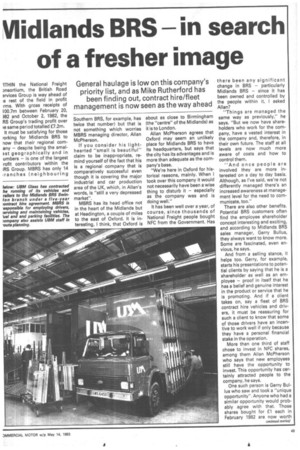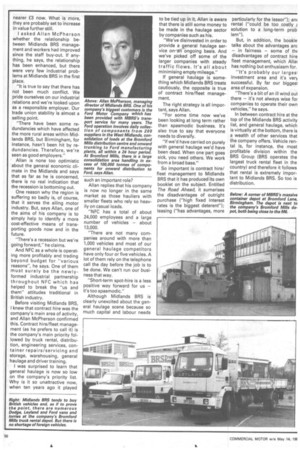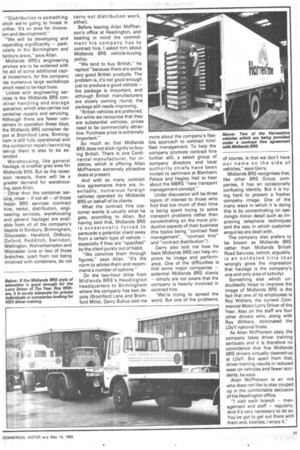Vlidlands BRS in search of a fresher image
Page 51

Page 52

Page 53

If you've noticed an error in this article please click here to report it so we can fix it.
General haulage is low on this company's priority list, and as Mike Rutherford has been finding out, contract hire/fleet management is now seen as the way ahead
ITHIN the National Freight ansortium, the British Road arvices Group is way ahead of le rest of the field in profit .rms. With gross receipts of 100.7m between February 20, 382 and October 2, 1982, the RS Group's trading profit over le same period totalled £7.2m. It must be satisfying for those forking for Midlands BRS to now that their regional cornany — despite being the smalast geographically and in umbers — is one of the largest ,refit contributors within the IRS Group. MBRS has only 14 'ranches (neighbouring
Southern BRS, for example, has twice that number) but that is not something which worries MBRS managing director, Allan McPherson.
If you consider his lighthearted "small is beautiful" claim to be inappropriate, remind yourself of the fact that his is a regional company that is comparatively successful even though it is covering the major industrial and car production area of the UK, which, in Allan's words, is "still a very depressed market".
MBRS has its head office not in the heart of the Midlands but at Headington, a couple of miles to the east of Oxford. It is interesting, I think, that Oxford is about as close to Birmingham (the "centre" of the Midlands) as it is to London.
Allan McPherson agrees that Oxford may seem an unlikely place for Midlands BRS to have its headquarters, but says that the city has its advantages and is more than adequate as the company's base.
"We're here in Oxford for historical reasons, mainly. When I took over this company it would not necessarily have been a wise thing to disturb it — especially as the company was and is doing well."
It has been well over a year, of course, since thousands of National Freight people bought NFC from the Government. Has there been any significant change in BRS — particularly Midlands BRS — since it has been owned and controlled by the people within it, I asked Allan?
"Things are managed the same way as previously," he says. "But we now have shareholders who work for the company, have a vested interest in the company and, therefore, in their own future. The staff at all levels are now much more aware of costs and how to control them.
"And once people are involved they are more interested on a day to day basis. Although, as I've said, we're not differently managed there's an increased awareness at management level for the need to communicate, too."
There are also other benefits. Potential BRS customers often find the employee shareholder concept interesting and exciting, and according to Midlands BRS sales manager, Gerry Bullus, they always want to know more. Some are fascinated, even envious, he says.
And from a selling stance, it helps too. Gerry, for example, starts his presentations to potential clients by saying that he is a shareholder as well as an employee — proof in itself that he has a belief and genuine interest in the product or service that he is promoting. And if a client takes on, say a fleet of BRS contract hire vehicles and drivers, it must be reassuring for such a client to know that some of those drivers have an incentive to work well if only because they have a personal financial stake in the operation.
More than one third of staff chose to invest in NFC shares, among them Allan McPherson who says that new employees still have the opportunity to invest. This opportunity has certainly attracted people to the company, he says.
One such person is Gerry Bullus who saw and took a "unique opportunity". Anyone who had a similar opportunity would probably agree with that. Those shares bought for El each in February 1982 are now worth nearer £3 now, What is more, they are probably set to increase in value further still.
I asked Allan McPherson whether the relationship between Midlands BRS management and workers had improved since the staff buy-out. If anything, he says, the relationship has been enhanced, but there were very few industrial problems at Midlands BRS in the first place.
"It is true to say that there has not been much conflict. We pride ourselves on our industrial relations and we're looked upon as a responsible employer. Our trade union stability is almost a selling point.
"There have been some redundancies which have affected the more rural areas within Midlands BRS, but Birmingham, for instance, hasn't been hit by redundancies. Therefore, we're seen as good employers."
Allan is none too optimistic about the general economic climate in the Midlands and says that as far as he is concerned, there is no real indication that the recession is bottoming out.
One reason why the region is suffering so badly is, of course, that it serves the ailing motor industry. But, says Allan, one of the aims of his company is to simply help to identify a more cost-effective means of transporting goods now and in the future.
"There's a recession but we're going forward," he claims.
And NEC as a whole is operating more profitably and trading beyond budget for "various reasons", he says. One of them must surely be the newlyformed industrial partnership throughout NFC which has helped to break the "us and them" attitudes traditional in British industry.
Before visiting Midlands BRS, I knew that contract hire was the company's main area of activity, and Allan McPherson confirmed this. Contract hire/fleet management (as he prefers to call it) is the company's main priority followed by truck rental, distribution, engineering services, container repairs/servicing and storage, warehousing, general haulage and driver training.
I was surprised to learn that general haulage is now so low on the company's priority list. Why is it so unattractive now, when ten years ago it played such an important role?
Allan replies that his company is now no longer in the same market as those hauliers with smaller fleets who rely so heavily on casual loads.
"NFC has a total of about 24,000 employees and a large number of vehicles — about 13,000.
"There are not many companies around with more than 1,000 vehicles and most of our general haulage competitors have only four or five vehicles. A lot of them rely on the telephone call the day before the job is to be done. We can't run our business that way.
"Short-term spot-hire is a less positive way forward for us — it's too spasmodic."
Although Midlands BRS is clearly unexcited about the general haulage scene because so much capital and labour needs to be tied up in it, Allan is aware that there is still some money to be made in the haulage sector by companies such as his.
"We've disinvested in order to provide a general haulage service on—air ongoing basis. And we've picked off some of the larger companies with steady traffic flows. It's all about minimising empty mileage."
If general haulage is something which Midlands BRS treats cautiously, the opposite is true of contract hire/fleet management.
The right strategy is all important, says Allan.
"For some time now we've been looking at long term rather than spasmodic business. It's also true to say that everyone needs to diversify.
"If we'd have carried on purely with general haulage we'd have been dead. When one part goes sick, you need others. We work from a broad base."
So important is contract hire/ fleet management to Midlands BRS that it has produced its own booklet on the subject. Entitled The Road Ahead, it sumarises the disadvantages of outright purchase ("high fixed interest rates is the biggest deterent"); leasing ("has advantages, more particularly for the lessor"); an rental ("could be too costly solution to a long-term prob lem").
But, in addition, the bookie talks about the advantages an — in fairness — some of thE disadvantages of contract hire fleet management, which Mar has nothing but enthusiasm for.
"It's probably our largesi investment area and it's very successful. By far our biggesi area of expansion.
"There's a bit of an ill wind oul there — it's not always wise for companies to operate their own vehicles," he says.
In between contract hire at the top of the Midlands BRS activity list, and general haulage, which is virtually at the bottom, there is a wealth of other services that the company offers. Vehicle rental is, for instance, the most profitable division within the BRS Group (BRS operates the largest truck rental fleet in the country) and therefore it follows that rental is extremely important to Midlands BRS. So too is distribution. "Distribution is something vhich we're going to invest in urther. It's an area for innovaion and development."
"We will be developing and !xpanding significantly — part:Wady in the Birmingham and 3anbury areas," says Allan.
Midlands BRS's engineering ;ervices are to be widened with he aid of some additional capial investment, for the company las numerous large workshops Nhich need to be kept busy.
Linked with engineering ser/ices is the Midlands BRS con:ainer handling and storage )peration, which also carries out container repairs and servicing. Although there are fewer containers in operation these days, the Midlands BRS container depot at Bromford Lane, Birmingham is still fully operational and the container repair/servicing set-up there is also to be extended.
Warehousing, like general haulage, is another grey area for Midlands BRS. But as the recession receeds, there will be a greater demand for warehousing, says Allan.
Other than the container service, most — if not all — of those major BRS services (contract hire, rental, distribution, engineering services, warehousing and general haulage) are available from all of the company's depots in Banbury, Birmingham, Gloucester, Hereford, Oldbury, Oxford, Redditch, Swindon, Wellington, Wolverhampton and Worcester (one or two of those branches, apart from not being involved with containers, do not carry out distribution work, either).
Before leaving Allan McPherson's office at Headington, and bearing in mind the commitment his company has to contract hire, I asked him about Midlands BRS vehicle-buying policy.
"We tend to buy British," he replied "because there are some very good British products. The problem is, it's not good enough just to produce a good vehicle — the package is important, and although British manufacturers are slowly coming round, the package still needs improving.
"British vehicles are preferred. But while we recognise that they are substantial vehicles, prices need to be commercially attractive. Purchase price is extremely important."
So much so that Midlands BRS does not stick rigidly to buying British. There is one Continental manufacturer, for instance, which is offering Allan McPherson extremely attractive deals at present.
And with so many contract hire agreements there are, inevitably, numerous foreign vehicles operated by Midlands BRS on behalf of its clients.
What the contract hire customer wants is usually what he gets, according to Allan. But having said that, Midlands BRS is occasionally forced to persuade a potential client away from a certain type of vehicle — especially if they are "specified" by the client purely out of habit.
"We convince them through figures," says Allan. "It's the norm to advise them and recommend a number of options."
On the two-hour drive from Midlands BRS's Headington headquarters to Birmingham where the company has two depots (Bromford Lane and Bromford Mills), Gerry Bullus told me more about the company's flexible approach to contract hire/ fleet management. To help the company promote contract hire further still, a select group of company directors and local authority chiefs have been invited to seminars at Blenheim Palace and Hagley Hall to hear about the MBRS "new transport management concept."
Under discussion will be three topics of interest to those who find that too much of their time is being spent trying to solve transport problems rather than concentrating on the more productive aspects of their business (the topics being "contract fleet management", "contract hire" and "contract distribution").
Gerry also told me how he feels Midlands BRS can help improve its image and performance. One of the difficulties is that some major companies — potential Midlands BRS clients — simply are not aware that the company is heavily involved in contract hire.
"We're trying to spread the word. But one of the problems, of course, is that we don't have our name on the side of vehicles," says Gerry.
Midlands BRS recognises that, like other BRS Group companies, it has an occasionally confusing identity. But it is trying hard to present a fresher company image. One of the many ways in which it is doing this is by concentrating on seemingly minor detail such as improving telephone techniques and the way in which customer enquiries are dealt with.
The company also prefers to be known as Midlands BRS rather than Midlands British Road Services, (which, arguably, is an outdated title that wrongly gives the impression that haulage is the company's one and only area of activity).
Something else which undoubtedly helps to improve the image of Midlands BRS is the fact that one of its employees is Roy Withers, the current Commercial Motor Lorry Driver of the Year. Also on the staff are four other drivers who, along with Roy Withers, dominated the LDoY national finals.
As Allan McPherson says, the company takes driver training seriously and it is therefore no coincidence that five Midlands BRS drivers virtually cleaned-up at LDoY. But apart from that, driver training results in reduced wear on vehicles and fewer accidents, he says.
Allan McPherson is an md who does not like to stay couped up in the comfortable seclusion of his Headington office.
"I visit each branch — management and staff — regularly. And it's very necessary to do so. You've got to get out there with them and, besides, I enjoy it."




























































































